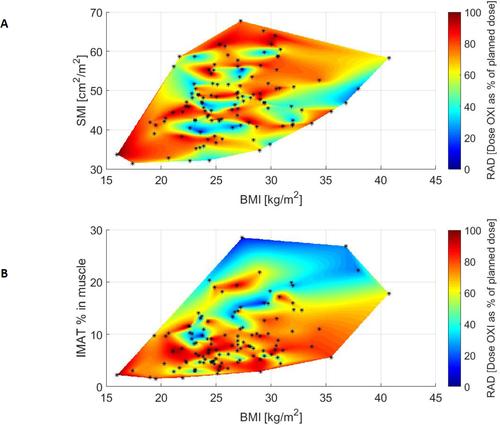Side-effects related to adjuvant CAPOX treatment for colorectal cancer are associated with intermuscular fat area, not with total skeletal muscle or fat, a retrospective observational study
引用次数: 2
Abstract
Chemotherapeutic treatment is regularly accompanied by side‐effects. Hydrophilic chemotherapeutics such as capecitabine and oxaliplatin (CAPOX), often used in colorectal cancer treatment, predominantly accumulate in non‐adipose tissues. Therefore the aim of this paper was to investigate whether body composition and fat infiltration in the muscle (muscle attenuation and intermuscular‐adipose‐tissue [IMAT] content) are associated with chemotherapy‐induced toxicities.

一项回顾性观察性研究表明,与辅助CAPOX治疗结直肠癌相关的副作用与肌间脂肪面积有关,而与总骨骼肌或脂肪无关
目的化疗通常伴随着副作用。常用于结直肠癌治疗的卡培他滨和奥沙利铂(CAPOX)等亲水化疗药物主要积聚在非脂肪组织中。因此,本文的目的是研究身体成分和肌肉中的脂肪浸润(肌肉衰减和肌间脂肪组织[IMAT]含量)是否与化疗引起的毒性有关。方法在这项回顾性观察性研究中,我们收集了2006年至2015年期间接受CAPOX辅助化疗的115例结直肠癌患者的数据。有关癌症特征的信息来自荷兰癌症登记处。检索诊断性CT扫描以评估第三腰椎骨骼肌和脂肪组织的横截面积。从医学图表中检索剂量限制性毒性[DLT]和相对给药剂量(占基于bsa的计划剂量的百分比)的信息。使用cox回归和线性回归分析确定身体成分、肌肉质量和化疗引起的毒性之间的关系。结果:我们发现在我们的队列中,DLT的发生率为90%:50%的患者减少了剂量,30%的患者推迟了下一个周期,4%的患者完全停止治疗,6%的患者在第一次DLT时住院。最常见的是减少奥沙利铂的剂量,同时保持卡培他滨的剂量不变。Cox回归分析显示,在第一个治疗周期或到第一次DLT的时间内,身体成分或肌肉质量与DLT没有关联。多元线性回归显示,较高的IMAT指数和IMAT肌肉百分比与较低的奥沙利铂相对给药剂量相关。结论结论;在这些接受CAPOX治疗的CRC患者中,只有IMAT与剂量限制性毒性相关,而骨骼或脂肪区域与剂量限制性毒性无关。
本文章由计算机程序翻译,如有差异,请以英文原文为准。
求助全文
约1分钟内获得全文
求助全文

 求助内容:
求助内容: 应助结果提醒方式:
应助结果提醒方式:


